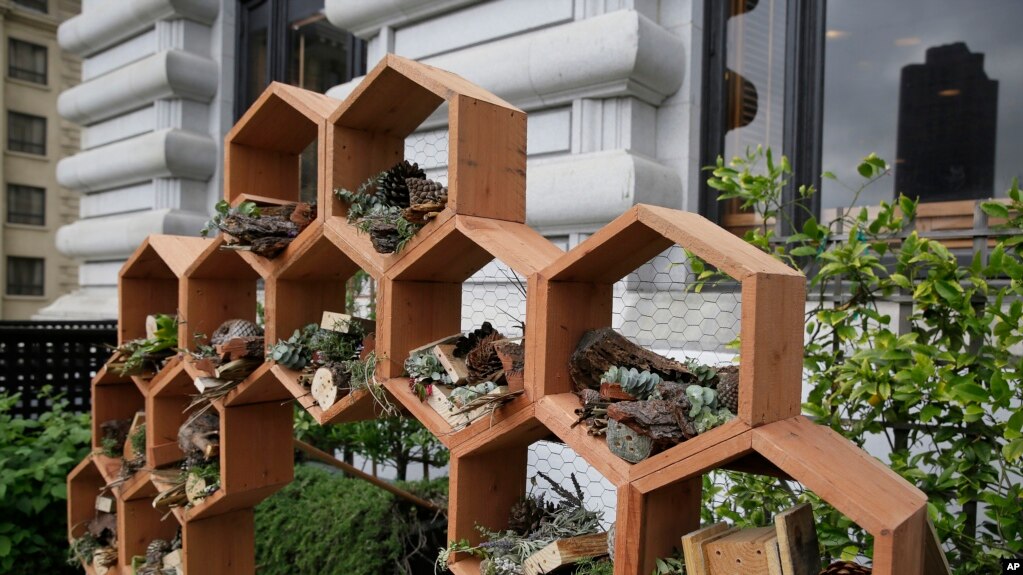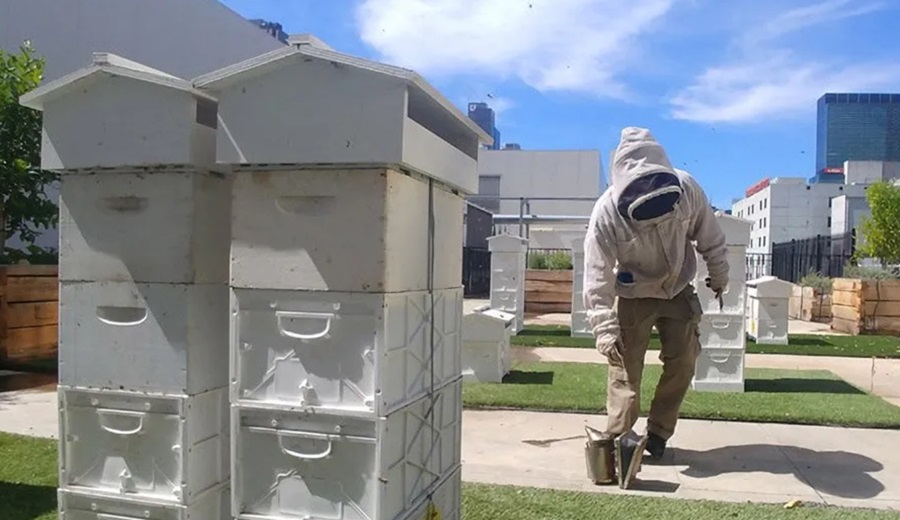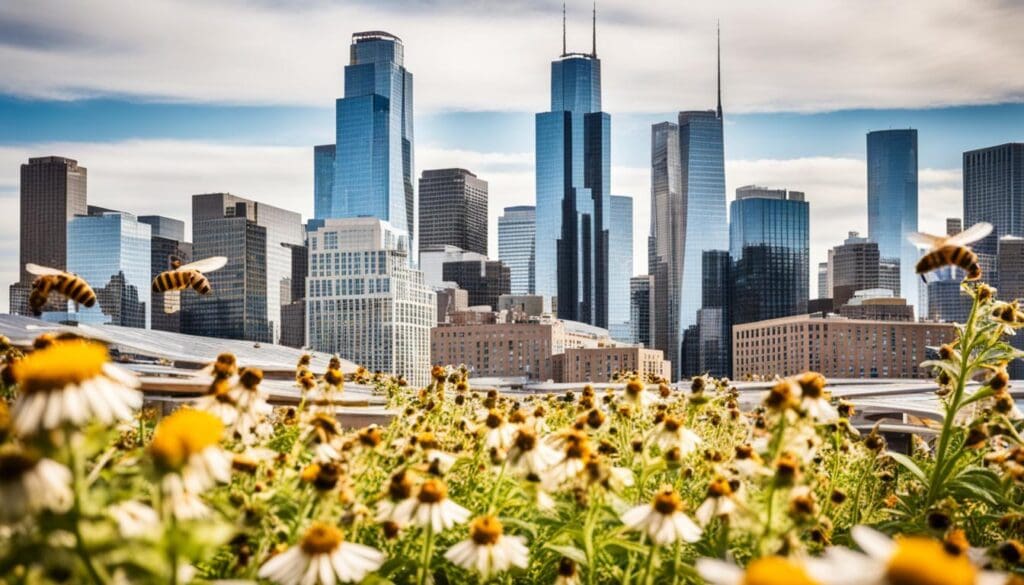In the bustling metropolis of Buenos Aires, a quiet revolution is taking place—urban beekeeping. While beekeeping is often associated with the countryside, the rooftops of this vibrant city are now home to thriving bee colonies, offering a unique blend of nature and urban life. This practice is not only transforming unused urban spaces but also contributing significantly to environmental sustainability.

The Emergence of Urban Beekeeping in Buenos Aires
Urban beekeeping in Buenos Aires has gained momentum in recent years, driven by a global trend toward sustainable agriculture and environmental awareness. Several key buildings and organizations across the city have embraced this practice, turning rooftops into productive beehive sanctuaries.
- Palacio Barolo: One of the most iconic buildings in Buenos Aires, Palacio Barolo, has become a symbol of the city’s commitment to sustainability. The rooftop of this historic building now hosts several beehives, managed by local beekeepers dedicated to producing honey and promoting biodiversity.
- MALBA (Museo de Arte Latinoamericano de Buenos Aires): MALBA has integrated urban beekeeping into its broader environmental initiatives. The museum’s rooftop hives not only produce honey but also serve as an educational tool for visitors, highlighting the importance of bees in urban ecosystems.
- El Ateneo Grand Splendid: This famous bookstore, often hailed as one of the most beautiful in the world, is also home to rooftop beehives. The initiative, managed by a local beekeeping collective, supports honey production and urban biodiversity.
- Sustainable Beekeeping Organizations: Several organizations in Buenos Aires are at the forefront of promoting urban beekeeping. Apicultura Urbana Buenos Aires and Fundación Espacios Verdes are two leading groups that provide training, resources, and support for urban beekeepers. They also collaborate with local schools and community centers to educate the public about the benefits of beekeeping.
The Environmental Impact of Urban Beekeeping
Urban beekeeping in Buenos Aires is about more than just producing honey; it plays a crucial role in maintaining the city’s environmental health.
- Pollination Services: Bees are essential pollinators, responsible for the reproduction of many plants. In Buenos Aires, urban beekeeping enhances the pollination of flowers, trees, and urban gardens, contributing to the city’s green spaces. Research from the University of Buenos Aires has shown that urban beekeeping can significantly boost the health and diversity of these ecosystems.
- Biodiversity Enhancement: The presence of bees encourages the planting of pollinator-friendly plants, which in turn supports a wider range of flora and fauna. This contributes to the overall biodiversity of Buenos Aires, making the city more resilient to environmental changes.
- Climate Resilience: Bees are sensitive to environmental changes, making them excellent bioindicators. Monitoring urban bee populations can provide valuable data on the health of the city’s environment, helping to inform policies on pesticide use, urban planning, and climate adaptation strategies.

Challenges and Opportunities in Urban Beekeeping
Despite its many benefits, urban beekeeping in Buenos Aires is not without challenges:
- Space Constraints: Finding suitable locations for beehives in a densely populated city can be difficult. Rooftop beekeeping has emerged as an effective solution, but it requires careful planning to ensure that the bees have access to adequate food sources and are safe from urban pollutants.
- Pesticide Exposure: Pesticides used in urban gardening and landscaping pose a significant threat to bee health. Beekeepers in Buenos Aires must work closely with local authorities and community groups to identify and mitigate these risks. The city’s ongoing efforts to create pesticide-free zones around key beekeeping sites are crucial in this regard.
- Community Relations: Educating the public about the importance of bees and addressing concerns about safety are essential for the success of urban beekeeping. Initiatives like the community outreach programs run by Apicultura Urbana Buenos Aires help bridge the gap between beekeepers and residents, fostering a sense of shared responsibility for the environment.

The Socioeconomic and Cultural Significance of Beekeeping
Urban beekeeping in Buenos Aires is not only an environmental endeavor but also a socioeconomic and cultural one:
- Economic Opportunities: Beekeeping provides income opportunities for urban dwellers, particularly in marginalized communities. Honey and other bee products can be sold at local markets, creating a sustainable source of revenue. The city’s beekeeping initiatives have been supported by local businesses, which purchase and promote locally produced honey.
- Cultural Heritage: Beekeeping has deep roots in Argentine culture, particularly in rural areas. Urban beekeeping projects help preserve these traditions, bringing them into the modern urban context. Events like the annual “Fiesta de la Miel” celebrate this cultural heritage, attracting both locals and tourists.
- Educational Impact: Beekeeping projects often include educational components that teach people about the importance of bees and the role they play in our food systems. Workshops and school programs run by organizations like Fundación Espacios Verdes are integral to raising awareness and fostering a new generation of environmentally conscious citizens.
The Future of Urban Beekeeping in Buenos Aires
The future of urban beekeeping in Buenos Aires looks bright, with increasing support from both the public and private sectors. As more buildings and organizations embrace this practice, the city is set to become a leader in urban sustainability. The integration of beekeeping with other urban agriculture initiatives, such as rooftop gardens and community farms, holds great promise for creating a more resilient and self-sufficient city.
As Buenos Aires continues to grow and evolve, urban beekeeping will play a key role in ensuring that the city remains not only livable but also vibrant and ecologically balanced. The bees of Buenos Aires are more than just producers of honey; they are vital contributors to the city’s future sustainability.
Marta Mattone’s Vital Mission: Championing Bee Conservation in Buenos Aires

Maria Olson
At VAMOS Academy, I craft stories sprinkled with my love for exploration and food. Whether it’s the tang of a local dish or the rhythm of a new dialect, I bring these experiences to you. Ready for an adventure that tickles your taste buds and ignites your wanderlust? Let’s embark on this journey together, one story and one bite at a time.






